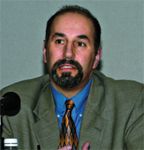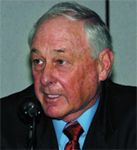Specialization: Panelists delve into top professional issues facing veterinary medicine; DVM Newsmakers Summit
We struggle in training veterinarians to treat all species and all specialties. The general public of course recognizes that it is difficult to be a veterinarian because you have to be able to treat every species.
Editor's Note: DVM Newsmagazine asked six thought-leaders to talk about five of the most pressing issues facing the veterinary profession at CVC East in Baltimore. During the succeeding months, each of the issues introduced at the DVM Newsmaker's Summit will be presented for publication. This month, the panel takes on specialization and its impact on the delivery of veterinary care and veterinary education. Drs. Joan Hendricks and Gary Block introduced issues surrounding specialization.
About the panelists:
Dr. Bonnie Beaver, Texas A&M University, former president of the American Veterinary Medical Association.
Dr. Gary I. Block, Ocean State Veterinary Specialists in East Greenwich, Rhode Island; former president of the Rhode Island Veterinary Medical Association.
Dr. Joan Hendricks, dean of the University of Pennsylvania School of Veterinary Medicine.
Dr. Lonnie King, director of strategic innovation for the Centers for Disease Control and Prevention; former dean of the Michigan State University College of Veterinary Medicine.
Dr. David Lane, practitioner and consultant in Cardondale, Ill.
Moderator Kerry M. Richard, attorney with Tobin, O'Connor, Ewing and Richard in Washington, D.C.
Dr. Jack O. Walther, practitioner in Lamoille, Nev., and former AVMA president.
Dr. Hendricks: I was asked to talk about the trends in specialization, and this is highly relevant to the way we train veterinarians and who we have employed in the academic setting.

Dr. Joan Hendricks
We struggle in training veterinarians to treat all species and all specialties. The general public of course recognizes that it is difficult to be a veterinarian because you have to be able to treat every species. We all know it is kind of true, but kind of not. The bigger challenge is that everyone expects a veterinarian to be able to do brain surgery, endocrine testing, advanced behavioral modification as well as run an excellent business, step-up and provide leadership, manage their staffs and have superb communication skills.
We are not training people to do all of those things.
Our trainers are generally specialists within an area like surgery or internal medicine. It's been stated that we aren't training people broadly to do what's needed in family or general practice. About half of our students do expect to go on for further training of some kind either in clinical specialization, gain a PhD or increasingly MPH or its equivalent. What about the half who fully expect in fours years, lacking the additional four years of training that an MD would have, to walk out the door, hit the ground and be a completely competent family practitioner.
If we truly want that to happen, I think what we are going to need to change the way we train. We could have a national system where some schools are designated as spots for the four years maybe with a possibility of additional training through CE, and we focus more on business management, communication skills, maybe marketing and maybe knowing when to refer.
Other schools could allow for tracking toward advanced training in preventive care. It hasn't been something that we all thought through nationally, but it is something I think we're beginning to recognize.
A great boon to all of us is the public interest in seeking specialized care for their pets essentially outpace the supply of even of specialists. Many of our specialties are driven by people's demand, like critical care. We hear the requests: "Why don't you do dialysis?" or "My grandmother has it, why don't you have my pet on a ventilator?" And I cannot tell you what a surprise this was that the public was pressing and willing to bare the costs that we're charging them. Sometimes the costs are in five figures with full information about the low possibility of a good outcome.
It's just this companion animal bond connection they have. They're pushing us to have a multi-tier system and parenthetically it's really pushing the academic veterinary practice into a tertiary or quaternary referral situation where we are competing with our own graduates who are establishing excellent and almost academic practices.
We know, in order to attract clients, we're moving into really doing clinical trials or developing entirely new approaches. We just opened our interventional radiography and minimally invasive surgery unit complete with lithotripsy. These are the kinds of things that we need to do to attract clients. But you can imagine how extremely difficult it is to train a veterinarian to do routine practice. And I can't easily see a situation where within 10 years we will not need to have some completely different way to train people if they expect to go out and be fully qualified veterinarians in a family practice in four years as opposed to continuing beyond that.
And another challenge for us in academia is because of the extreme demand for specialists and the very satisfying career that people can have as specialists. We have a great difficulty recruiting them back into academia and retaining them at the salaries we pay, which are a fraction of private practice. I usually say that fraction shouldn't be less than half, but if it's less than half you're not going to get them no matter how committed they are. If it's more than half, then you're going to get a small number of extremely committed people who just really want to be on the forefront and enjoy the academic environment.
We're rapidly moving toward a multi-tiered system without having really thought it through. Some of it is good, and some of it is extremely difficult.
Dr. Block: As Dr. Hendricks said, I think there's general agreement that there is a net movement of specialists out of academia and into private practice although I don't know the scope or the magnitude. As someone who works in a 25-doctor practice, I can say about half of our specialists have come from a university and ended up in our practice.

Dr. Gary I. Block
I sometimes complain about the stresses of owning a referral and emergency hospital, but when you look at it, there are probably fewer financial pressures on private specialty referral practices than general practices these days. We are in the up slope of a huge trend, and it's been made easy in part because of some of the issues that Dr. Hendricks outlined. These days, there often is little difference in the type of equipment available between private practices and vet schools, and many specialty practices have internships and residencies, and doctors so inclined have an opporunity to teach. Combine this with the financial advantages of private practice, and you see why there is a net movement of specialists out of academia. The conclusion that I made from non-scientific querying of my own staff is that unless you are interested in clinical and, potentially more important, basic research there's not a lot of attractiveness these days for many specialists to look for jobs in academia.
Compensation is a huge issue and because of some of the financial pressures that our profession is dealing with in graduating debt and starting salaries, many people who otherwise enjoy the intellectual stimulation of academia have gone into private practice and essentially created that environment without some of the bureaucracy associated with universities. I don't want to over generalize, but I think it's a fair assessment, and most university people agree, that there is a certain inefficiency and slowness to respond in academia that many private practices seem to have eliminated.
With regard to my place in the profession as a specialist in private practice, there is a belief that I think we all like to see ourselves as colleagues, but a part of us wonders at what point do we become competitors.
There's this concept of a difference of standard of care, whatever that is, for generalists and specialists that raises a number of difficult questions. What do I do as a specialist if a case comes to me, and I feel it has fallen below some standard-of-care level? Are we moving toward a model where veterinary general practitioners are going to mimic what's happening in human medicine? Are general practitioners essentially gatekeepers? They do snots and shots and anything else above and beyond goes to a specialist? And lastly, can and should hospitals like my own play a larger role in training veterinarian students and future specialists?
Dr. Beaver: I've got some real concerns relative to the training of specialists, since I am one. The specialists' organizations as a whole tend to expect most of the training of residents to occur at the university level. There are some exceptions to that, and it is changing, but once these residents have received their training they tend to go out into private practice.

Dr. Bonnie Beaver
Thus, universities have a hard time recruiting specialists for a number of reasons. The one that I think is not often mentioned is lifestyle. Another area of concern in academics has to do with the funding of these residency programs. The early programs, particularly in pathology, internal medicine, surgery for example, did get into university funding mode. So, they have an ongoing program every year to bring in one or two new residents in that area. But many of the newer specialty areas such as critical care, animal behavior and neurology did not have built-in funding. So, in order to get a residency program, they have to look at non-traditional areas of funding primarily industry. Some of these programs are able to get enough money depending on how universities look at funding from client fees, but most cannot. For the most part, funding for newer residencies is difficult, and yet those areas where there's a large demand within the public for more people to serve that public. I think I'd like to hear our panelists talk about how we get funding, and how we increase the opportunities for these specialists. What models can we use to attract specialists back into universities to teach not only new veterinarians but also residency programs?
Dr. King: I agree with Dr. Hendricks. I see the colleges of veterinary medicine differentiating. Differentiating in that a group of schools would probably just work with general practitioners, while another group of schools will be involved with biomedical research and a third group of colleges specialize in specialization to train interns and residents. These schools are not going to be able to do all three functions. Part of the reason is that the veterinary teaching hospital model is probably not economically viable over the next 10 years. We'll see this differentiation start.

Dr. Lonnie King
Secondly, I see new roles and possibilities for veterinary technicians. We already have specialized training for vet techs, like human medicine, whether it's in anesthesiology or critical care. I see them playing much more of a role especially in food animal practices. They will be more hands-on, if you will, under the supervision of veterinarians. It will create great opportunities for veterinary technicians.
Thirdly, I agree there's a real tension now between training residents and what kind of job will a specialty practice do in terms of learning objectives, taking time when you have a bottom line to meet versus schools that really are prepared to do that. And so I think we have to look at a new model.
The fourth part is that in being around a lot of our students over the last 10 years, I think there's a possibility that we'll see veterinarians change careers more frequently. We'll see bursts of activities for five, six or seven years, moving over to maybe a CDC or public-health role, or moving from specialization back into academia. We are actually starting to see that a little bit in terms of the lifestyle. So we're not going to see somebody go into private practice for 30 or 40 years perhaps but start changing careers, taking some time off, looking for new opportunities and that may very well be the model of the future.
Dr. Lane: I'd like to see as many general practitioners as possible come back into the universities. The universities have pretty much said no we don't want GP's teaching our kids, but I learned a lot from some of the old timers out in the trenches. They helped with my education along with the specialists. We do need more specialists; in fact, I think there's a maldistribution of specialists. Our veterinary schools were born on an agrarian idea that the legislature would fund them because of the food and fiber portion of our profession. Now we've moved totally away from food and fiber focus at our schools. The state legislatures are asking why we are funding programs for dogs and cats. The veterinary schools are strangled for money. We've got to find the Betty White of this world to come in and help us fund these programs better. I doubt if all this money will come from the state as far funding a continuing expansion of specialists in companion animal medicine.

Dr. David Lane
Dr. Walther: I have just a brief comment on a challenge that's going to come as a result of these tremendous changes occurring and that is the medical/legal issue of when to refer. And I think I would like to see the guidelines come from the profession rather than from the legal ramifications of our not doing it. This is something that's going to have to be taught in the schools; it's going to have to be an education for practitioners and the public on when is the proper time.
Dr. Block: When I was prepping for this talk, I came across a JAVMA paper from the early '90s that surveyed practice owners on some of the surgical skills that they felt graduating seniors should be able to perform and they included in the top five were fracture repair, PU surgery, cruciate surgery and an FHO. That was 15 to 16 years ago. These days, I don't think you could get a student to not refer one of these cases based on the training he or she receives in veterinary school. I'm the beneficiary of an excellent veterinary education, but does it make sense that we have our students spend 50 percent of their surgery block watching intrathoracic surgery and 14 hemilaminectomies knowing that when they see the down dog in practice they're going to try cutting it themselves?
Ms. Richard: From the perspective of human medicine, certainly residency training programs have been around for years, but one of the reasons they're so well funded is because they do receive public funding through Medicare reimbursement.

Kerry M. Richard, JD
There is no parallel system in veterinary medicine. So if a specialty clinic trains a resident, the only way they make money off that resident is by charging for their services to private payers which means they're doing more work than they are learning in many instances.
It's not necessarily an effective model. Within the academic institutions, they're finding difficult opportunities to train without funding residents. To push for specialization through greater residency programs may not work for veterinary medicine at least until a funding source comes out. I know we're going to get into this idea of third-party payers later which may in fact end up being that source of funding as it is on the human side in many cases.
Dr. Walther: We should never forget that a large part of our population lives in areas that are not going to have specialists for at least the time being, and we can't discourage young veterinarians who are willing to do cruciates not try them. I think there's a tendency, and I see this in the younger veterinarians and the students that I've worked with, is they don't think they can do those procedures. It is incumbent upon those of us in practice and those who know enough in academia that if a student or young veterinarian is willing to tackle some of these procedures, we have to encourage them. I practice in an area right now where I'm 300 miles from the nearest specialist and most of my clients are not willing, under any circumstances, to travel that far. Specialization is wonderful; it's made a difference in our profession, but there still is room for the good surgeon practitioner who is not a specialist in another discipline.

Dr. Jack Walther
Dr. Beaver: I would like to add one quick comment to that too. There are a large number of clients who are not willing to pay fees for specialty care. So, that is a factor we're going to have to come to grips with — this dichotomy of the economics within our profession.
Ms. Richard: From a legal point of view, the standard of care question is changing because of the availability of specialists. If a client's willingness to pay determines the level of care, it raises a very interesting question in terms of potential malpractice liability.
If the standard is that you refer a cruciate repair to an orthopedics' specialist, but your client doesn't want to pay for that, so you do it yourself and there is a bad outcome, what happens to the standard of care? I think it's very different from human medicine because of the level of choice clients have in this system. For veterinary medicine, it will be interesting to see how juries sort that one out ultimately.
Podcast CE: A Surgeon’s Perspective on Current Trends for the Management of Osteoarthritis, Part 1
May 17th 2024David L. Dycus, DVM, MS, CCRP, DACVS joins Adam Christman, DVM, MBA, to discuss a proactive approach to the diagnosis of osteoarthritis and the best tools for general practice.
Listen